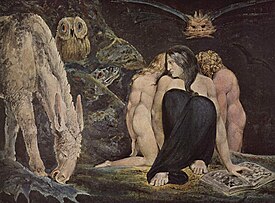Enitharmon
Enitharmon is a major female character in William Blake's mythology, playing a main part in some of his prophetic books.
Within Blake's myth, she represents female domination and sexual restraints that limit the artistic imagination.
In a letter from Blake to his friend Thomas Butts, Jr. on 22 November 1802, he claimed that his place at Surrey had "Enitharmon's bower".
As poetic instinct, Enitharmon is represented as being born of the sexual problems that happen during puberty.
In his later myth, the sight of Enitharmon's birth caused Urthona to fall and be born from Enion.
In her sexual system, there are four parts: Manathu-Varcyon (desire), Antamon (sperm), Theotormon (frustration), and finally Sotha (war).
These are represented by sexual desire being contained to Ethinthus (body), which leads to Leutha (guilt), followed by Oothoon (frustration) and ends with Thiralatha (erotic dreams).
Love is supposed to leave one to a higher state, and the perversion of sexuality, in Blake's view, leads to destruction.
[5] The Female Will is born from an object of affection refusing to give up its independence, and the concept represents what prohibits an individual from being able to have true vision.
[8] Enitharmon appears in Europe a Prophecy, which compares her rule in regards to the fall of Christian culture.
[9] The bulk of the work is devoted to Enitharmon's domination of the material world and puts forth various sexual rules through religion.
In Jerusalem The Emanation of the Giant Albion, she is connected to poetry, and she realizes that she must eventually vanish in the end.
The design shows the Queen of Heaven, who represents feminine rule and the glass is of materialism.
